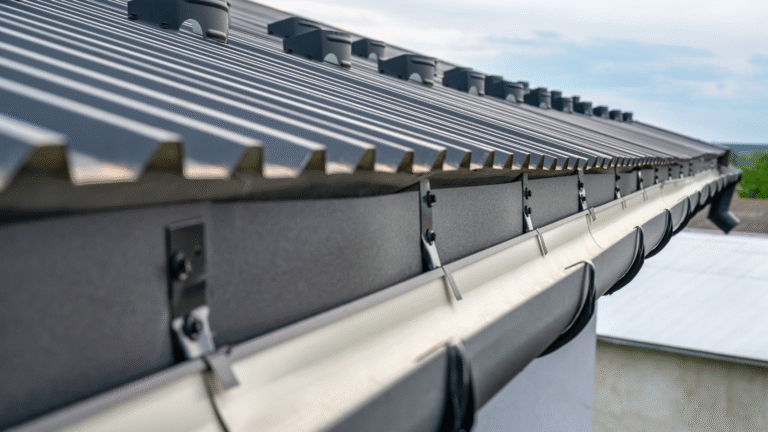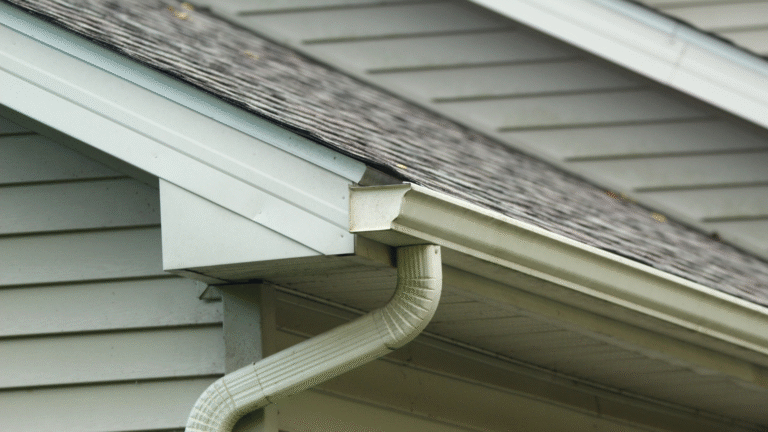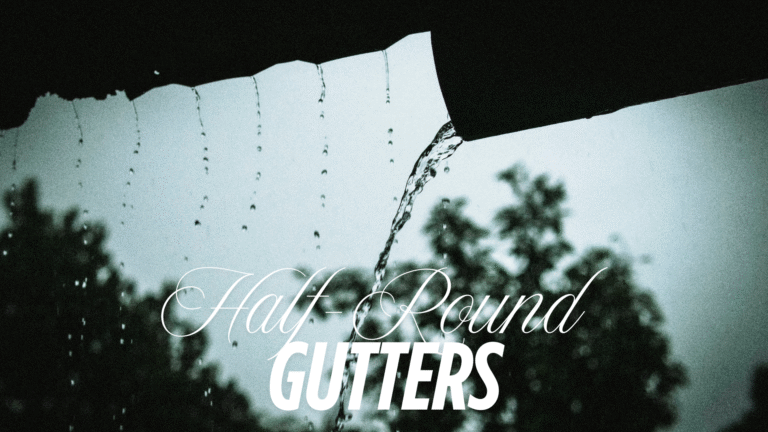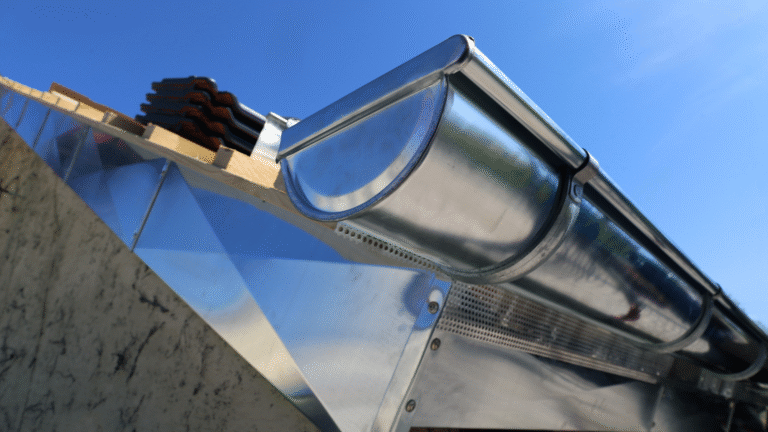Gutter protection in NJ plays a crucial role in protecting homes from water damage. However, in New Jersey, where heavy rainfall, snow, and autumn leaf fall are common, clogged gutters can quickly become a serious issue. Without proper protection, gutters can accumulate leaves, twigs, and debris, leading to blockages that prevent proper water drainage. This not only causes water overflow, but also damages the roof, siding, and foundation of a home. Additionally, stagnant water in clogged gutters creates a breeding ground for pests like mosquitoes and rodents, further adding to the problem.
Homeowners in NJ must take proactive measures to keep their gutters clear and functional year-round. Investing in reliable gutter protection solutions can significantly reduce maintenance efforts while preventing costly home repairs. By installing high-quality gutter guards, covers, or screens, homeowners can ensure proper water flow, minimize debris buildup, and extend the lifespan of their gutter system. In this guide, we will explore the best gutter protection solutions available to help prevent clogging and protect homes in New Jersey’s unpredictable climate.
Table of Contents
Why Gutter Protection is Essential in NJ?
New Jersey experiences a mix of weather conditions throughout the year, including heavy rainfall, snow, and seasonal leaf shedding. Without proper gutter protection, debris can accumulate, leading to blockages that prevent efficient water drainage. This can result in severe structural damage, costly repairs, and health hazards due to mold and pest infestations. Installing a reliable gutter protection system is crucial for homeowners looking to safeguard their property and reduce maintenance efforts.
Impact of Heavy Rainfall and Snowfall
Weather Condition | Potential Damage to Gutters | Consequences for Home |
Heavy Rainfall | Overflowing gutters due to clogging | Water damage to walls, basement flooding |
Snow Accumulation | Excessive weight on gutters | Sagging or detached gutters, roof leaks |
Ice Dams | Frozen water blocking drainage | Structural damage, mold growth |
Damage to Roofing, Siding, and Foundations
Blocked gutters force water to overflow, causing it to seep into the roof and siding, leading to rot, mold, and water stains. Over time, persistent moisture exposure can weaken shingles, deteriorate wood structures, and cause leaks inside the home. The foundation is also at risk, as water pooling around the base of the house can lead to cracks and erosion, compromising the structural integrity of the building.
Preventing Pest Infestations and Mold Growth
Clogged gutters provide an ideal environment for pests such as mosquitoes, rodents, and birds, which nest in the damp debris. Stagnant water also promotes mold and mildew growth, which can spread to the walls and interior of the home, posing serious health risks. Gutter protection solutions help prevent these issues by ensuring that water flows freely, reducing standing water and organic buildup that attract pests and encourage mold formation.
Types of Gutter Protection Solutions
Choosing the right gutter protection system is essential to prevent clogging and ensure effective water drainage. Various solutions are available, each designed to keep debris out while allowing water to flow freely. Below are the most effective gutter protection options for homeowners in New Jersey.
Gutter Guards
Mesh Gutter Guards
Mesh gutter guards feature a fine metal or plastic screen that covers the gutter, preventing leaves, twigs, and other debris from entering while allowing rainwater to pass through. These guards are effective in high-leaf fall areas and are easy to install, making them a popular choice for homeowners.
Reverse Curve Gutter Guards
Also known as surface tension guards, reverse curve gutter guards have a curved design that directs rainwater into the gutter while forcing leaves and debris to slide off. They provide excellent protection against clogging but often require professional installation to ensure optimal performance.
Bottle Brush Gutter Guards
These guards consist of bristles placed inside the gutter, allowing water to flow while blocking larger debris. They are easy to install and maintain but may require periodic cleaning to remove accumulated dirt and small particles.
Gutter Covers
Perforated Aluminum Covers
These metal covers have small holes that allow water to pass through while blocking larger debris. They are highly durable, rust-resistant, and ideal for handling heavy rainfall in New Jersey’s climate.
Solid Surface Covers
Solid gutter covers work by directing rainwater into the gutter through a narrow slit while leaves and debris slide off the surface. They are effective at reducing maintenance needs but may struggle to handle extremely heavy downpours.
Gutter Screens
Fine Mesh Screens
Similar to mesh guards, fine mesh screens have smaller openings that block even tiny debris, such as pine needles and roof grit. They offer excellent protection but may require occasional cleaning to prevent clogging of the mesh itself.
Foam Inserts
Foam gutter inserts fit inside the gutter, allowing water to pass through while blocking debris. They are affordable and easy to install but may deteriorate over time due to moisture exposure and mold growth.
Gutter Helmets
How They Work
Gutter helmets use a curved design that relies on surface tension to direct rainwater into the gutter while deflecting leaves and debris. They are typically made of metal and installed over the existing gutter system.
Benefits and Drawbacks
Gutter helmets offer long-term protection and significantly reduce maintenance needs. However, they are one of the most expensive gutter protection options and usually require professional installation. Additionally, they may not perform well in extreme rain conditions, where water can overshoot the gutter instead of flowing inside.
By selecting the right gutter protection solution, New Jersey homeowners can prevent costly damage, reduce maintenance efforts, and ensure their gutters function efficiently year-round.
How to Choose the Right Gutter Protection for NJ Homes?
Selecting the best gutter protection system for your New Jersey home requires careful consideration of various factors to ensure long-term effectiveness and durability. Here are the key aspects to remember:
- Evaluating Local Climate Conditions
-> New Jersey experiences heavy rainfall, snowfall, and seasonal leaf shedding, which can contribute to frequent gutter clogging.
-> Homes in wooded areas may require fine mesh or reverse curve guards to block leaves and small debris.
->Areas prone to ice dams should consider heated gutter systems or covers designed to prevent freezing. - Material Durability and Longevity
-> Choose materials like aluminum, stainless steel, or copper for long-lasting performance and resistance to rust and corrosion.
-> Plastic or foam-based guards may be cost-effective, but can deteriorate faster due to weather exposure.
-> Ensure the product has a warranty, as high-quality gutter protection systems often come with extended coverage. - Ease of Maintenance and Cleaning
-> Some gutter protection options, like mesh screens and foam inserts, may still require occasional cleaning to prevent fine debris buildup.
-> Reverse curve and solid surface covers are low-maintenance, but should be professionally installed for optimal efficiency.
-> Consider a system that allows easy access to the gutter for periodic inspections and maintenance.
By assessing these factors, homeowners can choose a gutter protection system that provides maximum efficiency, durability, and ease of maintenance for their NJ home.
Best Gutter Protection Brands in New Jersey
When it comes to selecting the best gutter protection for your home, choosing a reputable brand is essential. New Jersey homeowners need durable and efficient solutions that can withstand the region’s unpredictable weather conditions. Several top-rated brands offer high-quality gutter guards, covers, and screens designed to prevent clogging and reduce maintenance. These brands have built a strong reputation for their innovative designs, durability, and effectiveness in keeping gutters free of debris.
Leading Manufacturers and Their Offerings
Some of the most trusted gutter protection manufacturers in New Jersey include LeafFilter, Gutter Helmet, and Raptor Gutter Guard. LeafFilter is known for its fine mesh stainless steel guards, which effectively block even the smallest debris while allowing water to flow freely. Gutter Helmet offers a solid-surface, reverse curve design that prevents leaves and twigs from entering the gutters while directing rainwater efficiently. Raptor Gutter Guard, on the other hand, provides a DIY-friendly aluminum mesh guard that is both durable and easy to install. Each of these brands offers unique solutions tailored to different budgets and home protection needs.
Comparing Price vs. Performance
Gutter Protection Brand Comparison
🏆 Brand | 💰 Price Range | 🔍 Key Features | ⭐ Performance Rating (Out of 5) |
LeafFilter | 💲💲💲💲 | Fine mesh stainless steel, professional installation, lifetime warranty | ⭐⭐⭐⭐⭐ |
Gutter Helmet | 💲💲💲💲 | Reverse curve design, solid surface, durable aluminum construction | ⭐⭐⭐⭐ |
Raptor Gutter Guard | 💲💲💲 | DIY installation, aluminum mesh, rust-resistant | ⭐⭐⭐⭐ |
Amerimax Gutter Guard | 💲💲 | Perforated aluminum, affordable, easy to install | ⭐⭐⭐ |
Foam Gutter Inserts | 💲 | Budget-friendly, simple DIY solution, requires frequent replacement | ⭐⭐ |
Professional vs. DIY Gutter Protection Installation
Choosing between a DIY gutter guard installation and hiring a professional contractor depends on various factors, including budget, time, and the complexity of the gutter protection system. While DIY solutions can be cost-effective, professional installation ensures long-term durability and efficiency.
DIY Gutter Guard Installation
Pros and Cons
✅ Pros:
- More affordable than professional installation.
- Allows homeowners to customize their setup.
- No need to wait for contractor availability.
- Many DIY products come with easy-to-follow instructions.
❌ Cons:
- Requires time, effort, and basic handyman skills.
- Incorrect installation may lead to water overflow or inefficiency.
- Some materials, like foam inserts, may degrade faster.
- Limited warranties compared to professionally installed systems.
Best Gutter Guards for DIY Setup
- Raptor Gutter Guard: Aluminum mesh, rust-resistant, easy to install.
- Amerimax Gutter Guard: Budget-friendly perforated aluminum guards.
- GutterBrush: Simple bottle brush-style insert that fits inside gutters.
Foam Gutter Inserts: Affordable but require frequent replacements.
Hiring a Professional Gutter Contractor in NJ
For homeowners in New Jersey looking for a hassle-free and long-lasting gutter protection solution, hiring a professional contractor is the best choice. Experienced gutter specialists ensure proper installation, preventing leaks, overflow, and structural damage caused by poor drainage. They use high-quality materials, custom-fit solutions, and offer warranties that DIY installations often lack.
Benefits of Professional Installation
- Expertise ensures correct placement and long-term effectiveness.
- High-quality materials and custom-fit solutions.
- Reduces safety risks associated with ladder work.
- Many professional installations come with warranties.
- Helps prevent issues like water overflow and improper drainage.
Cost Considerations
- Professional installation can range from $1,000 to $3,500, depending on home size and gutter type.
- LeafFilter and Gutter Helmet are premium options that often require professional installation.
- While the initial cost is higher, professionally installed systems tend to last longer and require less maintenance.
Seasonal Gutter Maintenance Tips
Regular gutter maintenance is essential to keep your home protected from water damage throughout the year. Seasonal changes in New Jersey bring heavy rain in spring, falling leaves in autumn, and snow in winter, all of which can impact gutter performance. Following a structured maintenance plan ensures your gutters remain clean and functional, preventing costly repairs.
Spring and Fall Cleaning Guide
- Spring Cleaning:
- Remove leaves, twigs, and pollen buildup from gutters.
- Check for any winter damage, such as cracks or loose sections.
- Flush gutters with water to clear small debris and ensure proper drainage.
- Inspect downspouts for clogs and make necessary repairs.
- Remove leaves, twigs, and pollen buildup from gutters.
- Fall Cleaning:
- Clear out fallen leaves and organic debris to prevent clogging.
- Install or inspect gutter guards to reduce maintenance needs.
- Ensure all fasteners and brackets are secure before winter.
- Clear out fallen leaves and organic debris to prevent clogging.
Trim nearby trees to minimize future debris accumulation.
Preventing Ice Dams in Winter
- Keep gutters and downspouts clear before the first snowfall to allow proper drainage.
- Insulate your attic to prevent heat loss, which can contribute to ice dam formation.
- Install heated gutter cables to melt ice and prevent blockages.
- Regularly check for ice buildup and use calcium chloride (not rock salt) to safely melt ice without damaging gutters.
Common Gutter Protection Myths Debunked
There are many misconceptions about gutter protection systems, leading homeowners to unrealistic expectations. While gutter guards and covers significantly reduce maintenance, they are not a one-size-fits-all solution. Understanding the truth behind these common myths can help homeowners make informed decisions about their gutter protection needs.
Do Gutter Guards Eliminate Maintenance?
One of the biggest myths is that installing gutter guards means never having to clean gutters again. While high-quality gutter protection reduces the amount of debris entering the system, small particles like dirt, pollen, and roof grit can still accumulate over time. Occasional inspections and light cleaning are still necessary to ensure proper water flow and prevent blockages.
Are All Gutter Covers the Same?
Not all gutter covers offer the same level of protection. Some are designed to block only large debris, while others, like fine mesh guards, prevent even tiny particles from entering. The effectiveness of a gutter cover depends on its material, design, and installation quality. Choosing the right type based on New Jersey’s climate and your home’s surroundings is essential for optimal performance.
Is Professional Installation Necessary?
While some gutter protection systems are DIY-friendly, professional installation ensures proper fit and long-term efficiency. Complex systems like reverse curve gutter guards and Gutter Helmet require precise placement to function correctly. Additionally, professional installers provide warranties and expert guidance, making the investment worthwhile for homeowners who want a reliable, low-maintenance solution.
By understanding these myths, homeowners can set realistic expectations and choose the best gutter protection system for their specific needs.
Conclusion
Investing in the right gutter protection system is essential for homeowners in New Jersey to prevent clogging, water damage, and costly repairs. Solutions like mesh gutter guards, reverse curve covers, and professionally installed gutter helmets offer long-term efficiency, while DIY options like foam inserts and perforated screens provide budget-friendly alternatives. Regular maintenance, regardless of the protection type, ensures optimal performance throughout the seasons. For the best results, homeowners should choose a solution based on their local climate, home structure, and budget. While DIY installations can work for some, professional installation guarantees durability and long-term protection. By selecting a high-quality gutter protection system, NJ homeowners can safeguard their property, reduce maintenance, and ensure efficient water drainage year-round.







